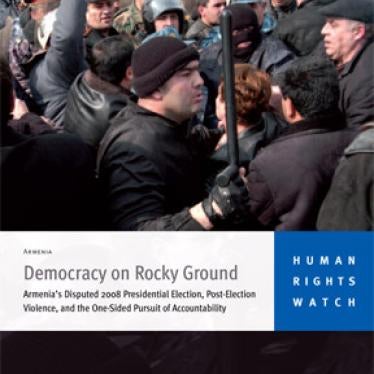(Berlin) – The authorities should immediately conduct a thorough investigation into an attack against a leading human rights organization in Armenia’s northern town of Vanadzor, Human Rights Watch said today.
On April 16, 2012, at approximately 11:00 a.m. a group of about 200 people gathered outside the office of the Helsinki Citizens’ Assembly (HCA) in Vanadzor, demanding that the screening of a series of short films made in Azerbaijan planned for the next day be cancelled. The crowd threw eggs and stones at the office, broke several windows and threatened the staff with further violence unless their demands were met. The group dispersed only after HCA leaders promised not to show the films.
“The history of conflict between Armenia and Azerbaijan means that a film from Azerbaijan is controversial for some, but that doesn’t justify not screening the films, far less any threat or use of violence,” said Giorgi Gogia, senior South Caucasus researcher at Human Rights Watch. “The authorities should promptly investigate the incident and ensure safety and security of the Helsinki Citizens’ Assembly staff.”
Armenia and Azerbaijan fought a seven-year war over Nagorno-Karabakh, a primarily ethnic Armenian-populated autonomous exclave in the Soviet Azerbaijan. Despite a 1994 ceasefire, the conflict yet has to be resolved politically.
The HCA’s Vanadzor office agreed to provide its premises to the Caucasus Center of Peace Making, a non-governmental organization working on confidence-building projects, which planned to show four short films by Azerbaijani filmmakers as part of a film festival. Over a dozen local civil society groups and political parties in Vanadzor issued a statement on April 14, calling on the public to protest against the film festival and prevent it from taking place. It was the festival organizers’ second attempt to show the films. They tried to proceed with the festival on April 12 in the town of Gyumri, but cancelled it in the wake of public protests.
On the morning of April 16, some 200 people – including former military servicemen, students and political party representatives – gathered in the center of Vanadzor and marched toward the HCA's office. According to one of the witnesses, the crowd was led by the Union of Nagorno-Karabakh War Veterans (“Yerkrapah”).
The HCA’s Vanadzor office tried to negotiate with the crowd and allowed several of the protest’s organizers to enter their offices to discuss the group’s demands. However, several of the rally participants also entered the premises and threatened to break the equipment and furniture unless the NGO agreed not to show the films. The crowd outside chanted slogans: “Traitors, Shame, and Turks!”
HCA Vanadzor director Artur Sakunts offered to postpone the film screenings, but the crowd demanded full cancellation and started to throw eggs and rocks at the office. They broke several windows, and one stone hit an HCA employee. Several protest organizers demanded that Sakunts cancel the film festival or potentially face further violence. When protest organizers told Sakunts that they could no longer control the angry crowd, he yielded to the threats and agreed to cancel the film screenings. The crowd dispersed shortly thereafter.
HCA’s Vanadzor office called the police as soon as the crowd gathered outside the office, but police arrived only after the protest dispersed. According to one eyewitness, there were at least four policemen near the office during the protest, but they did not intervene to try to prevent the attacks.
Armenia is a member of the Council of Europe, and a party to the European Convention on Human Rights, which guarantees the right to freedom of expression. In respecting and protecting the right to free speech, governments have an obligation not only to refrain from censoring free speech just because it may offend, but also to take measures to protect the rights of individuals to freedom of expression against violations by private persons. This is particularly the situation in a case such as this, when it is not the contents of the films that are alleged to be offensive, but the nationality and ethnicity of the film-makers to which some object.
“The decision to show a film by an Azeri film-maker may upset and offend some, but that in no way justifies this kind of mob violence or the cancellation of the film festival,” Gogia said. “The authorities should show their commitment to protecting free speech and guarantee secure conditions for the film screening to go forward.”
Background
The ‘STOP’ Film Festival planed to show four short films by Azerbaijani film-makers:
- A documentary, “The Flower of Desert,” by Tair Aliyev, the story of a German woman who married an Azerbaijani man at the end of the Second World War.
- “The House,” by Asif Rustamov, a tale about a clash of values and moral dilemmas driven by the grubby, sometimes criminal reality, behind a modern success story.
- “Cherish My Wings,” by Samir Kerimoglu, a postmodern fantasy of a young girl who inhabits her imagination, made vivid by the wonders of cinema, until the harsh reality of her small village life shatters the fantasy.
- “Idyll,” by Teymur Daimi, a philosopher, painter and filmmaker in experimental art, who explores questions about globalization through the medium of film.







